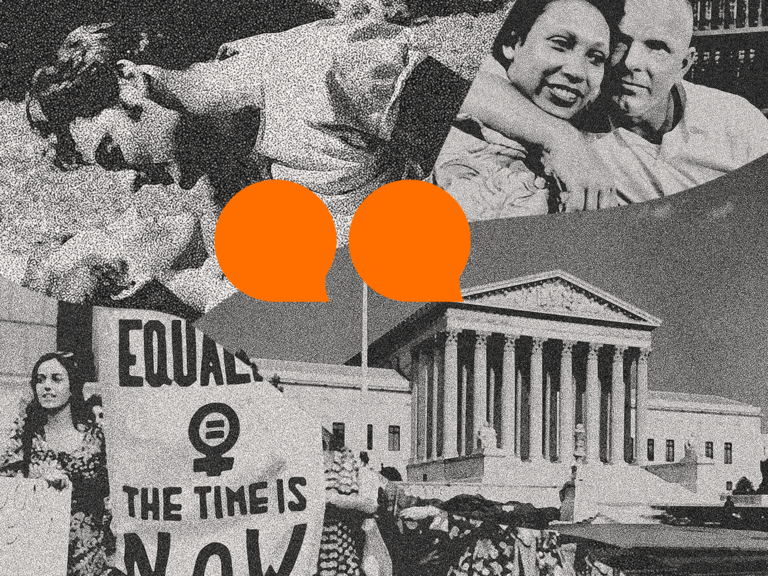Love & the Law: When Policy Decisions Affect Marriage Equality

This piece has been reviewed and fact-checked by Kirsten Palladino, an inclusivity consultant and the cofounder of Equally Wed.
In the narthex of a New York City Catholic Church, a wedding planner runs through his final checklist. The wedding party is neatly arranged. He smooths the bride's train, scans her hair for flyaways and adjusts her veil one last time. It's a sequence he's completed many times throughout his career as an event planner, but this time, something unexpected occurs.
The priest of the church hurries over and points to the planner, a gay man. "You're not welcome here," he says. "Please leave." The wedding party turns around in horror as the planner stands frozen. The bride, a mere seconds away from walking down the aisle, turns to him and whispers, "I'm so sorry." It's clear: The figure running the show has been asked to exit the building.
Jove Meyer, a Brooklyn-based wedding planner and designer, knew his footing in the world of weddings wasn't equal after that interaction, which occurred early in his career. "I didn't want to make a scene. It was her wedding day," he recalls. "I walked outside, sat on the stairs and cried my eyes out. The drivers were like, 'What are you doing out here? You're supposed to be inside.' I had just gotten kicked out of a church. I was enraged."
Indeed, couples and wedding professionals are feeling the reverberations of a deeply divided nation at this time. With a six-three conservative majority on the US Supreme Court, couples feel the effects of policies across issues. "It's distressing for each individual in a relationship when the news reports on [potential government] policies or voting that will impact people's financial wellbeing, job security, physical and emotional safety, and basic human rights," explains Candice Nicole Hargons, the founder and director of the Center for Healing Racial Trauma.
"What stresses the individuals in a relationship stresses the actual relationship," affirms Stan Tatkin, developer of the Psychobiological Approach to Couples Therapy. "We live in a dangerous, hostile and unpredictable world. Partners have to work together as allies." Before the ink dries on the marriage license, couples may broach policy-related discussions. After all, the law can influence lives; however, the wellbeing of your relationship will depend on how you respond to these external events.
Millions of people felt the policy's impacts in June 2022 when the Supreme Court overturned Roe v. Wade after half a century. But some knew in advance that a conservative majority would affect their rights. The ruling in Dobbs v. Jackson Women's Health Organization, which reversed Roe v. Wade, prompted policymakers to introduce reactive legislation. The House of Representatives quickly introduced the Respect for Marriage Act (RFMA), a bill that statutorily protects couples' fundamental rights—including interracial and same-sex marriages—and President Joe Biden signed it into law in December 2022. Many received the news with relief, but it also generated concern, particularly within the LGBTQIA+ community. In an ever-shifting and dubious political atmosphere, some felt as though their fundamental right to be in a loving relationship was at stake.
Historically, Americans believed that Supreme Court rulings regarding marriage had settled these issues. In 1967, Loving v. Virginia established the right of interracial couples to marry, deeming the ban on those unions unconstitutional under the Fourteenth Amendment. In 2015, Obergefell v. Hodges gave same-sex couples the constitutional right to marriage equality under Loving's precedent. Such decisions seemed like settled law. Now, couples who long took these rights for granted are concerned about the unraveling of decades of institutional change and fundamental human rights.
In addition, 2024 is an especially fraught time as it's an election year in the US. Many couples are concerned about what a possible Trump presidency could result in as it relates to marriage equality (among other human rights). "It's more important now than ever before that we stand up for equality, we champion it, especially for those who have not always had it, and could lose it," says Meyer.


He adds, "As a gay man who is now engaged and has been thinking about marriage my whole life, it's heartbreaking. Our community has fought for every right we have, and we're not asking for more than anyone else. We're fighting for equal rights, human rights, life, liberty and the pursuit of happiness. It's not just a wedding that I'm fighting for—it's the legal rights and protections that come with marriage. It's being able to be there if your partner is sick in the hospital: You can't be there unless you're legally family. It's having a family together. It's adoption or surrogacy. It's the tax benefits."
In This Article:
Family Planning
Since Roe was overturned, individual states have instituted early-term abortion laws. In April 2023, Florida Governor Ron DeSantis signed a six-week abortion ban, and within days, the governor of South Carolina followed suit. "With Roe v. Wade overturned, couples' sex lives may be at risk," speculates Hargons, who is also a sexologist. "Couples who do not wish to have children, or any more children, may be facing additional risk, especially if they're no longer using condoms. Other forms of birth control are valuable, but some have health side effects that not everyone can tolerate. Couples may feel forced to return to condom use, given that there are fewer options if they become pregnant."
"We know that women's health care is going to degrade further," adds Tatkin. "People are afraid that IVF might be affected too. Everything is up for grabs." For couples, topics like physical intimacy and family planning influence interpersonal dynamics. Clearly, Tatkin notes, "These issues put stress on relationships."



Health Care
Along with family planning and other health issues that may affect marriages, simple access to health care in the US also impacts millions of couples. Treatment and hospital visitation costs often lack transparency and clarity; there's also a lack of access. For many of the poorest citizens, health care is neither affordable nor accessible.
Marriage can leave you on the hook for your spouse's medical expenses. "Health care costs are a financial drain," says Chinitz. "There are cases where couples have divorced to remove themselves from that burden. Some go to great lengths to plan ahead to relinquish their assets in case they need to enter a senior care facility. This is where the government should be stepping in. Nobody should be impoverished as a result of their health or the health of their spouse."
A prevalent issue that often comes up in marriage equality conversations, especially for people with disabilities, has to do with healthcare benefits. Once legally married, those who face disabilities are often faced with losing benefits from the government, invalidating their love stories or leaving their relationships vulnerable.
Immigration Reform
Immigration is another subject that divides the population. Title 42—a pandemic-era emergency health authority that denied asylum to migrants crossing the border—expired in May 2023. Under Title 42, US border officials could turn away migrants (and did so 2.8 million times in the last three years) for reasons related to public health. A 2020 study published in the Journal of Ethnic & Cultural Diversity in Social Work revealed the impact of immigration policies, particularly on immigrants from Latin America. Participants surveyed reported increased mental health symptoms, such as anxiety, depression and stress, in response to immigration issues. "This happens not just at the individual level, but also on the family unit level," says Hargons.
For other couples, immigration policy impacts their relationship in a different way. In the 2009 romantic comedy The Proposal, a publisher (Sandra Bullock) ropes her assistant (Ryan Reynolds) into marrying her to prevent her from being deported from the US to Canada. Though the film is intended to be lighthearted, the premise is much heavier in reality. "The government is cracking down on what is a valid marriage and what is a fraudulent marriage," says Chinitz.
"It's currently spending a lot of time, money and resources to determine what marriages are real and enforce consequences for those trying to circumvent the system. While everyone is entitled to get married, the government can take action against fraudulent marriages." She predicts that Immigration and Customs Enforcement (ICE) and the federal government will start cracking down on such unions, and both the citizen and the immigrant could face serious penalties.
How Love Wins

As Americans are divided on these issues, it's important to approach conversations with empathy and grace. Couples facing these challenges should acknowledge them together. "Honor the stress with empathy, rather than denial, dismissal or minimization," says Hargons. "Hold space for the fear and pain that can come when policies have a personal impact. Create joyful experiences with each other to balance the dismay, but also consider that engaging in resistance together, even if it's writing letters to lawmakers, is a bonding activity."
"Keeping an eye on policy helps everyone stay informed and make decisions that work for them within this political context. But more importantly, it helps couples build a coalition and resist," affirms Hargons. "Couples have more power than individuals, so when more than one person goes to speak with a lawmaker about a potentially harmful policy, it is more likely to have an impact."
Even if you aren't directly affected, you could consider civic engagement. "Schedule phone calls and visits with these lawmakers to express how the policies are impacting your relationship health [or that of a loved one]," adds Hargons. "Connect with organizations who are leading the resistance against many of these policies. Donate to organizations that have developed resistance strategies." As you plan your wedding, make your partnership the priority. "The task of couples as a unit is adaptation," says Tatkin. "Sometimes that means moving to another state, or even out of the country. The biggest thing to remember is that the couple system needs to share power and authority. Think of it like you're running in a potato sack race with your partner."
Marriage can leave you on the hook for your spouse's medical expenses. "Health care costs are a financial drain," says Chinitz. "There are cases where couples have divorced to remove themselves from that burden. Some go to great lengths to plan ahead to relinquish their assets in case they need to enter a senior care facility. This is where the government should be stepping in. Nobody should be impoverished as a result of their health or the health of their spouse."
Policy Questions to Ask Each Other
Take a moment and reflect on legal policy and how it might affect your relationship. These questions will help guide you:
1. What are your feelings around how policies relate to a pregnant person's right to choose? If there was a complication during pregnancy that put the pregnant person's life at risk, how would you proceed?
2. If we are unable to have our marriage legally recognized in our current state, or feel like our state doesn't afford us the benefits associated with marriage, what are our next steps?
3. You and your partner disagree on policy issues. Discuss your opinions without imposing your beliefs or trying to change their mind.
Editor's Note: A version of this story first appeared in the Fall 2023 issue of The Knot Magazine. It has since been edited and updated by the writer to reflect current events.




















